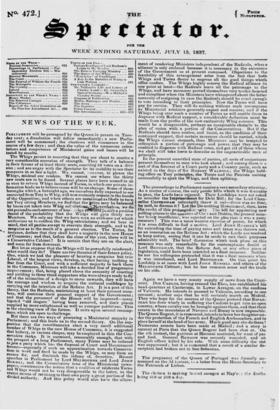The proceedings in Parliament receive a very secondary attention. As
a matter of course, the only public bills which it was desirable to pass, the Lords have rejected. Their Lordships were not asked to consider the Imprisonment for Debt Bill ; for the Lord Chan- cellor Corn:exam voluntarily threw it out—there was no time, he said, to discuss it ! Let the Do-nothing Government, then, have the credit of this prolonged.c, .ialty The bill for appainting new polling-places in the counties of Col.( and Dublin, the present num- ber being insufficietit, was rejected on the plea that it was a party measure ! This was a mere wanton exercise of power, for which it is even difficult to find a motive. LOrd JOHN RUSSELL'S bill for extending the time of paying rates and taxes was thrown out, as an innovation on the Reform Act ; which the Lords are resolved to keep entire, seeing that it can be made to suit their purposes admirably well. The brief discussion which took place on this measure was only remarkable for the contemptuous denial of Lord BROUGHAM', that the Reform Act, or any other piece of legislation, could have been intended as a final measure. Neither he nor his colleagues pretended that it was a final measure when it was introduced, said Lord BROUGHAM. On this point his Lordship is at issue with Lord JOHN Kassala.. and others of the MELBOURNE Cabinet ; but he has common sense and the truth on his side.


























